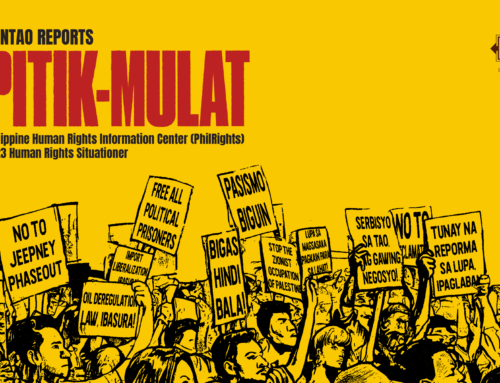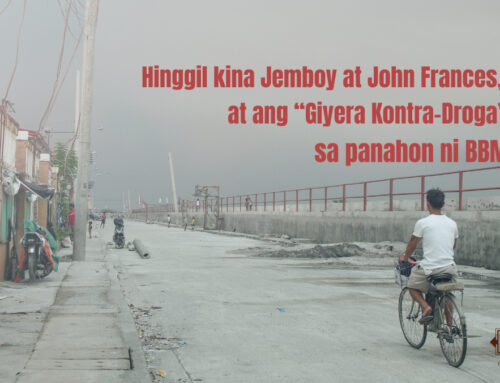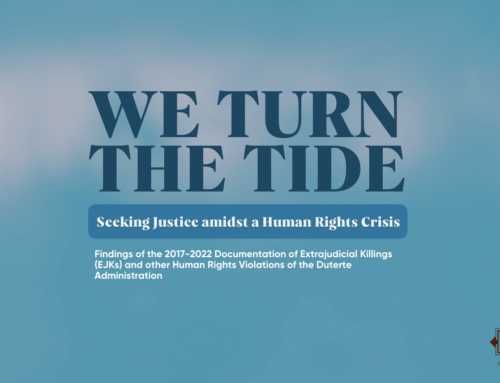by the Philippine Human Rights Information Center
Gloria choked back tears as she recalled how moving from Negros to Manila in the late 1990s made her feel uneasy. Her husband and siblings had made the move then, and there was pressure on her to follow them to the capital. But she didn’t want to.
“I had a heavy feeling about coming here. Parang bigat sa pakiramdam ko na pumunta dito.”
She remembered that feeling from more than 20 years ago as she recalled the tragedies that have now defined her life in Manila: the brutal deaths of her two sons. “I didn’t expect it would happen here. I didn’t expect that I would go through what it’s like to lose a child. Di ko po alam na dito ko mararanasan ang mawalan ng anak.”
Her first son was killed in February 2017, gunned down in what was supposed to be an anti-illegal drugs operation. Six months later, another son was murdered after he was picked up for questioning by police. His body was later found in a dump.
“Until now, I have not recovered. As a mother who lost her children, it was just too much. Hanggang ngayon mahirap makarecover. Bilang nanay na nawalan ng anak, di lang sobra, sobra sobra. Especially since I know they didn’t do anything wrong.”
***
Life was hard in Negros in the 70s and 80s, Gloria recalls. Her father was a carpenter, and her mother, a housewife. “Halos gutom kami. Kulang po sa pagkain. We were nearly starving. We didn’t have enough food. But my parents found a way. That’s how I remember the time of Marcos.”
She married a fellow Negrense who was also a carpenter and worked with his father. He found work in Manila, and asked her to move there too.
They raised eight children in a working-class community in Manila. Her first son—we will call him Raul—finished high school. He was a good kid, Gloria said. “He was a happy child, and always helpful. Masayahing bata. Tapos matulungin.” Once his teacher told Gloria about how Raul gave his baon, his lunch, to a classmate who didn’t have anything to eat. After his death, a neighbor told her how Raul gave them Php 200 because they need it to buy food. “I didn’t know about how good he was toward others. And I said, ‘Why did this have to happen. Bakit nangyari pa ito?’”
Raul was a painter and an electrician. “He wanted to lift us out of poverty. Sabi niya iaahon niya kami sa hirap,” Gloria said.
Raul got married and started his own family. He had five children and they lived together with Gloria and the rest of the family. They didn’t have much, but they had a good family life.
What Gloria would remember and miss most after the deaths she endured in 2017 was how happy she was with her children and their children—when violence had not ripped them apart.
***
Gloria readily admitted Raul had used illegal drugs—shabu. “But he was not using a lot,” she said. “Hindi talamak.”
He had personal family problems that he found hard to grapple with. It started when he and his wife separated and left their household. “He became confused and distracted. Parang balisa siya,” Gloria said. She confronted him about what was going on.
“He said, ‘Ma, I’m sorry. Pasensya na.’ He said he could not sleep because of his problems,” she said. That’s when he started using drugs. Gloria told him it was illegal and he should stop.” Her husband also told him that doing drugs was not the way: “I did not teach you to do that. Hindi ko kayo tinuruan ng ganyan. No matter how hard it is for me to work, I just focus on giving you a good life.”
Raul promised he would stop. But by then, there were frightening changes around them. Duterte had just been elected president and had unleashed a campaign to crack down on drug users and drug dealers.
There was a new climate of fear in their community. Word went out that the police aimed to arrest or kill at least 15 so-called drug offenders each night. It was a quota of sorts. She heard about this herself from leaders of her barangay. “Kinse katao gabi gabi ang kukunin. Fifteen people each night,” she said. She told her family, especially her sons: “We have to be careful now.” On Duterte, she said, “Siya itong berdugo ng Pilipinas. He is the country’s executioner. I was not wrong.”
***
One afternoon in February 2017, Raul told Gloria he wanted to attend a friend’s wake. Some of his siblings were going with him and Gloria told him to be careful and not stay out too long. “These are risky times. Ang hirap na ngayon ng panahong ito. Take care of your siblings”
Raul and his siblings were on their way to the wake when the trouble started. An anti-drug task force entered their area apparently as part of an operation. It was unclear what they were trying to do. But in the confusion, Raul got separated from his siblings. He was running across the community basketball court when he was stopped by the armed men. One of them opened fire.
Gloria had been in their home and did not know what had happened until he heard one of her children yell, “Si kuya nabaril”—their brother had been shot. She felt as if she had been swallowed by the sky and the ground. “Parang tinakpan ako ng langit at lupa.”
“I ran though I didn’t know where I was going.” She and her family didn’t know where to look. Witnesses said they had seen Raul raise his arms as if to surrender. But the police still shot him. Still, he tried to run away. Witnesses said they heard one task force member yell, “That’s not him. Hindi iyan!” Wounded, Raul fell in front of a house whose owner knew Gloria and was actually her friend. The friend heard Raul crying, asking for help. “My friend said she heard someone crying, asking for help. He was yelling, ‘Ma, help me!’”
Some of his friends took Raul to the hospital, Gloria was told. So, she and her family went there. When they reached the hospital, one of her children told her,
“Ma, he’s gone.”
There were policemen at the hospital and one of them asked her. “What happened, ate?” “Sir, don’t bother asking,” she said “Huwag ka nang matanong.” She and others recognized them as part of the group of 15 armed men who led the raid. “They just changed into uniforms,” Gloria said. “You did this,” she told the men.” You just changed your clothes. But you shot my son.” One of her other sons began cursing the men who then left the hospital.
Gloria wanted to see Raul’s body at the hospital. But her children prevented her from doing this. They didn’t want me to see him then. “Ayaw ng mga anak kong makita,” she said.
The night only became more challenging. Retrieving her son’s body so she and her family can mourn his passing turned into a mindlessly cruel process. At the police station, Gloria was told by an investigator that she would not be able to get the body until she signed a statement on who was responsible for her son’s death. The police wanted her to agree that a local notorious drug dealer, not the police, killed Raul.
“I was confused and didn’t know what to do,” Gloria said. “Was it the right thing to do or not? I signed even though it wasn’t true. Pumirma ako sa hindi naman katotohanan.”
***
Gloria’s other son—we will call him Jordan—took his older brother’s killing hard. He cried a lot, Gloria said. She said he told her: “I promise you, Ma, I will make them pay. Isusumpa ko, Ma. Gaganti ako.”
He had a tough time accepting Raul’s death. But at his funeral, Gloria watched Allan walk toward his brother’s coffin. They had been close, she said. “Even when they were already adults, they really bonded. Kahit malaki na sila, magbonding sila.”
Jordan also lived with Gloria and her family. Six months after Raul’s death, a violent tragedy struck again. It was, in many ways, a more painful encounter with cruelty and death under Duterte.
One day in August 2017, Gloria came home to find a worried daughter-in-law telling her, “Ma, they took kuya.” A barangay task force had arrested Jordan. The men had long arms, and they had put a sack on Jordan’s head when they took him.
“I just ran. I wanted to find him,” Gloria said. A tricycle driver who has Jordan’s friend told her that they put him in a jeep. She kept on running. She went to the barangay where they told her they didn’t know. She went to several police detachments. She went to one where the police told her, “Wala pa, ate. They are not here yet. They’re probably still driving around.” She kept looking, but could not find her son.
She and her children went home. But at around four a.m. her brother came to her house and said, “Have you heard?” And then he told her, “He’s gone. Wala na.”
“How can that be? They said they were just going to interrogate him. Sabi ng task force hihiramin lang. Kakausapin lang. He said they found him in a vacant lot near their neighborhood where they dumped the bodies from Tokhang, the summary executions. He was found in the early hours of the following day.
She was later told by a witness who said Jordan was killed at the police station. Her son was crying as the police tried to force him to confess to a crime, she was told. They beat him. And hours later, they put him in a black garbage bag.
Why does she think this happened to Jordan? The answer is simple, Gloria said: “Pera. Money. That’s how they make money. Every head means money. They just pick anyone. Magturo na lang nang magturo.”
Another party made money from her son’s death: the funeral parlor where the police took Jordan’s body. The manager said she had to pay them Php 45,000 before they could release the body. “They refused to give me my son. Ayaw nilang ibigay ang anak ko. I asked, why are you asking for such a huge amount? I told them the police killed my son and now you’re asking me for so much money?”
There were policemen at the funeral parlor then speaking with the owner. They turned to her when she said that. “I didn’t really care anymore then. Wala na talaga akong pakialam noon.”
“Are you sure the police did it?” someone asked.
“Who else would do something like that? They said they were just going to talk to him. But he ended up dead.”
The funeral parlor manager said she had to pay for the “serbisyo”—service.
“What service are you talking about?” Gloria asked. “My son’s coffin looks so ugly.
It’s so small that it looks like he got squeezed into it. Ang kabaong ng anak ko, ang pangit pangit. Parang siniksik siya. Ang liit-liit ng kabaong.”
The funeral manager reduced the price: Php 25,000. “I told them I cannot pay.”
A friend intervened and negotiated with the funeral parlor to have the price reduced even further to Php 17,000.
At Jordan’s funeral, Gloria’s anger boiled over. “I called out those who killed my son. They had to pull me away from my son’s coffin. Pinalayo nila ako sa kabaong ng anak ko.”
A barangay leader told her, “There’s nothing we can do. Wala na tayong magagawa.” Gloria bristled. Why did they take her son, not the drug lords who remain free, she said. “I was so angry I don’t remember what else I said. Sa galit ko, ‘di ko na alam ang pinagsasabi ko.”
***
Gloria’s ordeal did not end with the killing of her second son.
Three years later, she had a curious, strange encounter with the police who came to visit her one day. They wanted to know if she’s Raul’s mother.
“I was shocked,” Gloria recalled.
“Why are you looking for him? He’s dead. Patay na iyon,” Gloria told the police.
“We just want to see his death certificate and the police report,” the men told her.
It was an odd request, and their reason for making it was even more disconcerting, even frightening.
“You might be planning to file a case, so we just wanted to be able to help you. Kasi baka magsampa kayo ng kaso para matulungan namin kayo,” the men said.
“Why would you offer to help now?” Gloria said. “His death certificate, you can get that from someone else. And same with the police report. What are you trying to get these documents from me?”
“They said they would help me in filing a case. I told them, ‘I don’t need your help in filing a case.’”
The police said they would just come back. But they never did, even though the police campaign continued—even during the pandemic.
“It’s still happening,” Gloria said. “Even with the pandemic, they don’t care. Patuloy pa rin. Kahit may pandemic, walang sinasanto.”
Seeing policemen in her community brings back horrible memories. “They just come back again in my mind, these bad things. Paulit ulit sa utak ko, bumabalik na hindi maganda.”
***
But Gloria discovered a way to grapple and make peace with the memory of her sons’ deaths was to help others who went through what she endured.
She has taken on an important, if unexpected role, an organizer for PhilRights, who actively seeks out family members of other victims of Tokhang, the slaughter.
In her community and other poor neighborhoods, she has quietly found ways to reach out to the wives, daughters, mothers and other relatives of the tokhang victims.
“I would go to a wake and would look for the wife. I would hug her. Pumupunta ako sa lamay, ganoon, hinahanap ko talaga iyong asawa. Lumalapit ako sabay yakap. I would tell her, “Sister, I’m sorry for your loss. We went through the same thing. Ate, nakikiramay ako. Parehas tayo ng pinagdaanan.”
She’s aware of the risks. So, she would often talk to the wife or mother in private, away from other people. “Nag-uusap kami sa malayo sa maraming tao.”
“Of course, I feel what they are feeling. They would be like a relative. I would explain everything to her. ‘I also had a child. There were two of them. They were killed by the police. May anak ako, dalawa pa. Pinatay din ng mga pulis.”
Then she would tell the survivor about PhilRights, and the work it’s doing, reaching out to the families of victims, to document what they went through and to help them heal. Many of them accepted her invitation, she said. “They would say, ‘Yes, please help us join so that even if we have lost a son or a husband, we can find a way to attain justice.’”
“I have never encountered anyone who did not want to talk.”
In her community, Gloria has become known as the mother that victims of the slaughter can talk to, who can help find a way for them to also be heard. In many ways, it’s also her way of accepting and embracing what happened to her son.
“There is only one thing I want: to find justice for my sons. Para mabigyan ng hustisya iyong dalawa kong anak. I want to ease the pain I feel, to show that I still care for my sons, that I have not forgotten them. Hindi ko sila kinakalimutan.”








